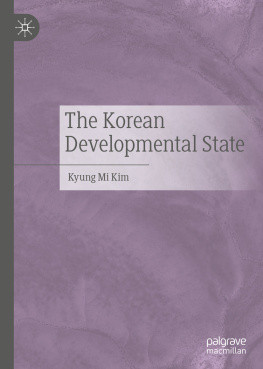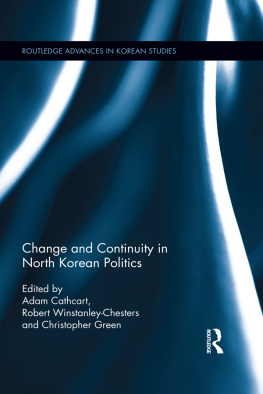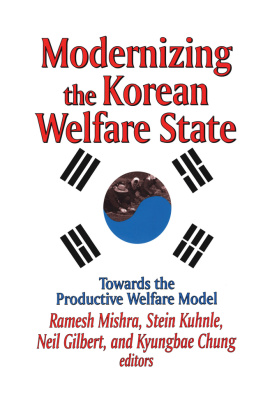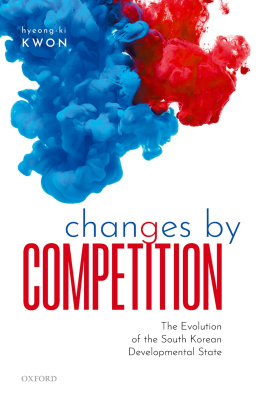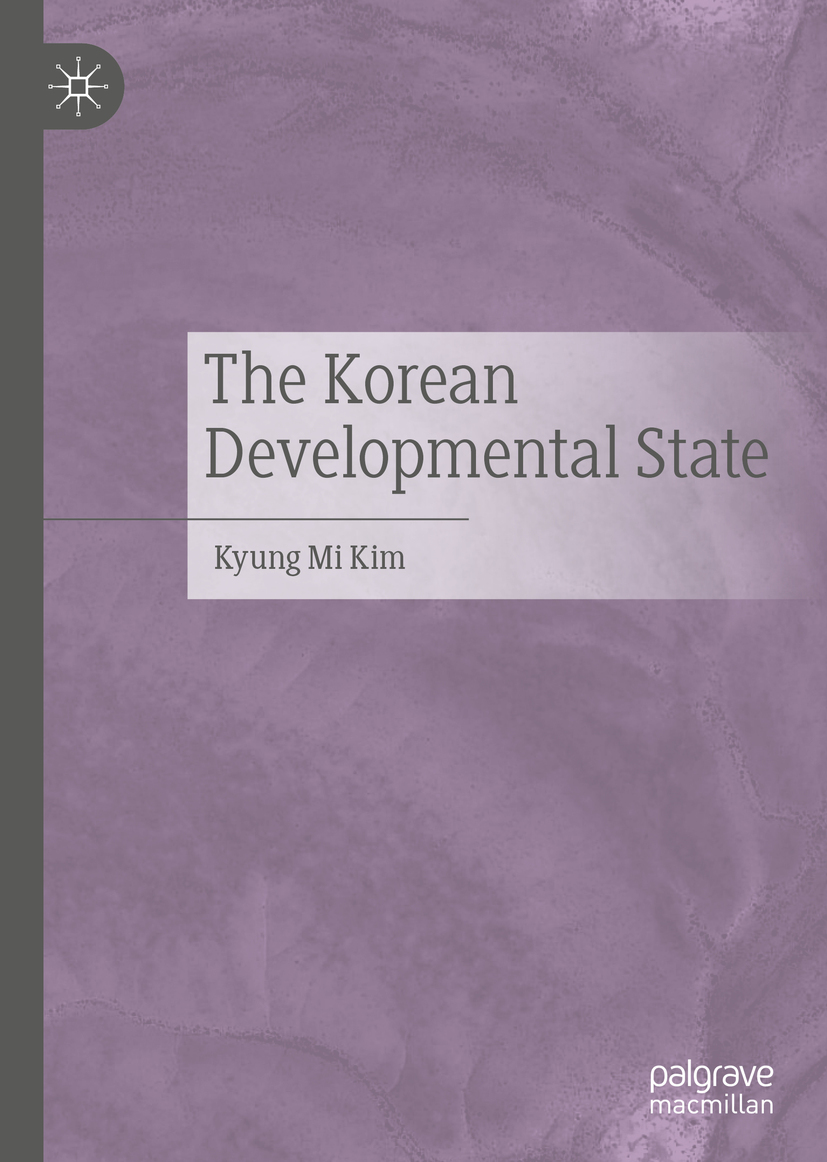Kyung Mi Kim
The Korean Developmental State
Kyung Mi Kim
Seoul National University, Seoul, Korea (Republic of)
ISBN 978-981-15-3464-5 e-ISBN 978-981-15-3465-2
https://doi.org/10.1007/978-981-15-3465-2
The Editor(s) (if applicable) and The Author(s), under exclusive license to Springer Nature Singapore Pte Ltd. 2020
This work is subject to copyright. All rights are solely and exclusively licensed by the Publisher, whether the whole or part of the material is concerned, specifically the rights of translation, reprinting, reuse of illustrations, recitation, broadcasting, reproduction on microfilms or in any other physical way, and transmission or information storage and retrieval, electronic adaptation, computer software, or by similar or dissimilar methodology now known or hereafter developed.
The use of general descriptive names, registered names, trademarks, service marks, etc. in this publication does not imply, even in the absence of a specific statement, that such names are exempt from the relevant protective laws and regulations and therefore free for general use.
The publisher, the authors and the editors are safe to assume that the advice and information in this book are believed to be true and accurate at the date of publication. Neither the publisher nor the authors or the editors give a warranty, expressed or implied, with respect to the material contained herein or for any errors or omissions that may have been made. The publisher remains neutral with regard to jurisdictional claims in published maps and institutional affiliations.
This Palgrave Macmillan imprint is published by the registered company Springer Nature Singapore Pte Ltd.
The registered company address is: 152 Beach Road, #21-01/04 Gateway East, Singapore 189721, Singapore
Preface
The Asian developmental states have attracted the attention of scholars and policymakers for decades. Until the 1990s, the developmental state school gained ascendancy based on its rich empirical studies in how to understand rapid economic development in East Asian economies, including Japan, South Korea (hereafter Korea), and Taiwan. Many developing countries were recommended to, and actually tried to, replicate aspects of the East Asian developmental state model.
However, since the Asian financial crisis of 1997, the relevancy of the developmental state for economic development has been seriously discredited. It is a widely held belief that in an era of globalization , such an interventionist states role is anachronistic at best and inimical to further development at worst. In actuality, Korea, as an ideal type of East Asian developmental state , suffered from a deep recession and experienced serious structural and strategic adjustments. In such circumstances, neoliberalism and the thesis of developmental state demise gained ascendancy. It is widely believed that the developmental state could not continue in Korea and it would emulate the Anglo-Saxon free-market model.
This book focuses on the following questions: How should we understand the continuing growth of the Korean economy even after the crisis of 1997? Is the recession because of the classical developmental state system or the neoliberal free market? To what extent has the Korean development model changed since 1997? Does it converge toward an Anglo-Saxon-style free-market economy, or can it be still classified as a variant of developmentalism ? What explains the cause and mechanism of change?
Based on in-depth field research and historically tracing its changes, this book suggests that in contrast to the neoliberal arguments and the developmental state demise literature, the state has played an important role in the Korean economic system since 1997 despite significant changes in the postcrisis period; the ongoing growth of the Korean economy in the 2000s can be understood by a new version of state-led capitalism , rather than by a neoliberal free-market system . More importantly, this book holds that unlike the institutionalist argument, the continuity of the states active role in the Korean economy is not because of path dependency , institutional stickiness, or historical legacies but because of the changes in developmental strategies and methods, that is, from classical authoritarian and exclusive to democratic and inclusive developmentalism , as well as from input-driven to innovation-driven strategy.
Kyung Mi Kim
Seoul, Republic of Korea
Acknowledgements
Since I launched this project in 2009, I have benefited from many people. It is a great pleasure to acknowledge numerous debts I owe to my committee, friends, and family. Without their support and encouragement, I could not have finished this project.
First and foremost, I would like to express my deepest appreciation to Professor Su-Ik Hwang, Myung Chey, Jung Bock Lee, Honglim Ryu, and Kyung Hoon Leem. They are all my mentors who guided me through the murky and turbulent process of undergraduate and graduate studies as well as after graduation. I also appreciate my doctoral committee members, Professors Chang Jae Baik, Hae Ran Lim, Toh-Kyeong Ahn, Suk-Jin Lew, Joo-myung Song, and Hyeong-ki Kwon, who provided me with tremendous encouragement, tough and insightful criticism, and soul-caring advice.
I will never forget the indispensable help offered by many people during my field research from 2010 to 2016: managers of supplier companies and original equipment manufacturers (OEMs), associations, and research institutes in the Korean government. In particular, I would like to give special thanks to former and current officials and policymakers in Korean government.
I also would like to thank many friends in the department of political science at Seoul National University, particularly Hyun Lee, Hee-Jung Sohn, Mi-hyun Yun, and In-Kyung Chung, who virtually broadened my intellectual horizon and made graduate life greatly joyful.
Finally, but most greatly, I would like to thank my family for their endless sacrifice, love, and encouragement. My sister Soo-hong, brother-in-law Joon-oh, my brother Tae-hwan, sister-in-law Bong-jung, my lovely nephew Ji-ahn, and nieces Do-yun, Na-ri, and Su-yun deserve my deepest appreciation. Finally, I dedicate this book to my parents, Yong Kim and Soon Ja Park, who taught me how to live a meaningful life by their own example.
About the Book
Chapterintroduces the puzzles and main arguments of this book and the methods and objects of study.
Chapterwith a critical examination of existing studies on the changes and continuity of Korean state-led capitalism , and presents theoretical alternatives and analytic frameworks.
Chapterpresents an overview of the history of Korean economic growth and what caused such rapid growth over 50 years, mainly based on economic statistical data. In this chapter, I offer reference points for discussions in the next chapters by showing that the driving forces behind Koreas economic growth have significantly changed.
In Chaps., this study argues that the qualitative transition of the Korean economy is not through the private firms voluntary actions in the free market but by the states strategic attempts and their interactions with corporations.
Specifically, Chap.analyzes the classical model of state-led capitalism in Korea. The traditional Korean developmental state established in the 1960s and 1970s was an authoritarian state dirigisme system, a variant of state-led capitalism .

